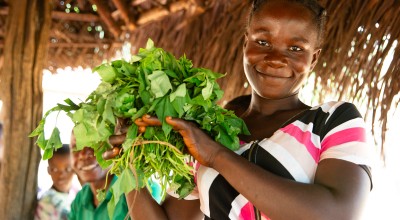
Read our 2024 annual report

Knowledge Hub
With funding from EU Humanitarian aid, Concern is supporting government health workers in Liberia and Sierra Leone to reach people in isolated areas with vaccination against Covid-19. As Ireland continues to live without restrictions thanks to a high vaccination rate, the distribution of vaccines within these two Western Africa nations remains a huge challenge.
Donating doses and ensuring they arrive on the tarmac is only half the battle. Many communities in both countries are isolated, without easy access to health facilities. Some are seeking more information around the vaccine from sources they can trust. As of this month, 1,438,154 people in Liberia have received full vaccination, about 28% of the population. In Sierra Leone, this figure stood at about 23.4% at the beginning of May, with 1,987,563 people fully vaccinated.
Economic impact
Over the past two years, the pandemic has fundamentally altered our day to day lives. There have been three lockdowns in Sierra Leone and two in Liberia. ‘Most of our business dropped’ Moyamba market finance secretary Felix Rodros says. ‘The effort to get the daily bread was difficult.’ Market traders were delayed or unable to travel to meet with their suppliers in Freetown. Those who rely on local markets for affordable food felt the impact.
Restrictions protect those most at risk from serious illness, but they can also expose those most vulnerable to food shortages. The experience of traders and customers in Moyamba is just one of the many ways Covid-19 has impacted Liberia and Sierra Leone.
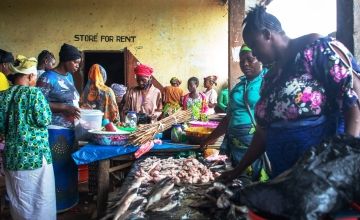
Vaccine hesitancy
“Even though health workers had been taking the vaccine, there were still people who were afraid to take it” county support officer Helen Kemum explains. “When vaccinating, you need people to go out into the community and talk to people about these concerns.” These people are mobilisers, who travel from town to town to address concerns about the vaccine. She ensures these mobilisers are knowledgeable enough to engage people with the facts.
With this in mind, EU Humanitarian Aid has partnered with Concern and the International Rescue Committee to increase vaccination rates among those most vulnerable in Sierra Leone and Liberia. ECHO has pledged €2.3 million overall towards transport, communications and data management.
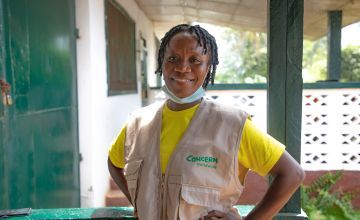
District delivery manager Samuel Ibrahim Koroma fulfils this mobiliser role in Sierra Leone. He engages local communities, encouraging them to get vaccinated and informing them of hand washing and social distancing practices. "You should not be afraid," he tells a group of workers in Kunthai town who fear the vaccine would leave them in too much pain to work on local farms. "We are part of this community, we are not here to suggest anything that will harm you or give you problems."
Close to home
Sometimes this means engaging those closest to us. Lorbu Suah’s sister was reluctant to get vaccinated, until she saw Lorbu’s own vaccination card. Seeing a close family member opt to take the vaccine reassured Lorbu’s sister. Lorbu received training and support from Concern to participate in Liberia’s vaccine roll out as a vaccinator in Grand Bassa County. "I was happy to take the vaccine because I am a health worker and I know it is safe. People see us take it and they know it is safe."
Helen concedes that convincing people to take their Covid vaccine is only half the battle. "You don’t want a case where people are waiting, and they think you are wasting their time." she says. Helen puts her nurse’s training to use by carrying out vaccinations herself to help vaccinators during busy clinics.
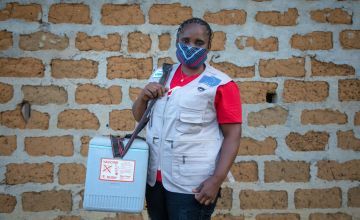
Accessibility
Lorbu schedules three or four clinics a week in Molon, a key market town in Grand Bassa County. As part of the EU ECHO grant, Concern pays for petrol so that Lorbu and other vaccinators can reach isolated villages faster. She and other vaccinators like Johnathan ride motorbikes through often challenging conditions. Jonathan describes wading through a river after a bridge was flooded during the rainy season.
This is not Johnathan’s first vaccination drive. "Yellow fever was bigger but this is different because people are being protected ahead of time." Jonathan now carries the Johnson and Johnson vaccine alongside other routine vaccinations such as polio, yellow fever and measles. He has been offering vaccines to members of the communities in Bomi county in Western Liberia for fifteen years. There is no phone signal here, so when he arrives at a stop on his rounds he tells the town crier which vaccines he has with him. He says 60% usually take the Covid-19 vaccine.
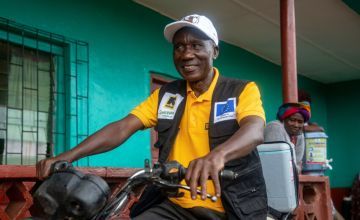
Samuel also makes use of a motorbike when travelling to carry out his awareness work. Among those who benefit from Samuel's ability to travel quickly are a room of Ocada riders he addresses about the benefits of vaccination. These motorcyclists perform a taxi service, weaving in and out of heavy traffic to get their passengers to their destinations. They are vulnerable to infection due to the close interactions they have with passengers day in, day out. Ocada rider Korambia Turay from Kambia says he was encouraged to take the vaccine after seeing his own friends and colleagues take it.
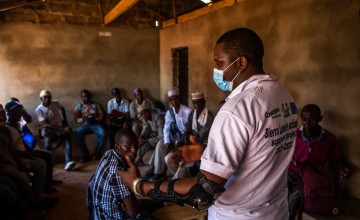
Samuel also makes use of a motorbike when carrying out his awareness work. In Kambia, Samuel addresses a room of Ocada riders about the benefits of vaccination. These motorcyclists perform a taxi service, weaving in and out of heavy traffic to get their passengers to their destinations. They are vulnerable to infection due to the close interactions they have with passengers day in, day out. Ocada rider Korambia Turay says he was encouraged to take the vaccine after seeing his own friends and colleagues take it.




